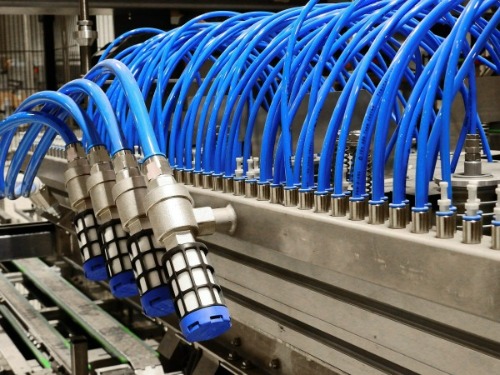ALL OF THE BENEFITS SURROUNDING COMPRESSED AIR FILTERS

In today’s fast paced market, manufacturers are under pressure to complete tasks with the greatest efficiency, productivity and in the shortest amount of time. With a growing demand for high-speed equipment, compressed air has become the solution.
Compressed air is an important part of the manufacturing process and is widely recognized as the fourth utility alongside water, electricity and natural gas. Since it plays such a large role in operating various types of equipment, the air needs to be filtered properly, making sure that it is clean and dry.
There are many benefits in utilizing compressed air filters, including the avoidance of downtime and maintenance of equipment, lower operating costs and eliminating pressure loss. Here is a closer look at why compressed air filters have become a crucial asset inside manufacturing plants:
Compressed air filters protect equipment to avoid downtime and maintenance.
When air is left unfiltered, pipes and fittings using compressed air may build up dirt, water and oil, contaminating the air. Any contaminants found in compressed air can result in corrosion of pipes and equipment, causing them to malfunction or break. Filters work to block any contaminants from entering the air to ensure all equipment is functioning properly and with a long lifespan.
Water build up poses a major threat to the functionality of equipment. Water can come from various places, including relative humidity, dew point condensation and cooling condensation. Since water build up can form so easily, it is important that the right filter is used to block any trace of it from entering the air.
Bacteria and viruses will be drawn to compressed air if it is exposed to moisture. If even a few of these microorganisms enter the clean and sterile compressed air, they can have a major impact on product quality or cause the equipment to be unfit for use and even recalled. Filters will ensure that any microorganisms will be blocked from entering the air.
Filters will lower operating costs.
In most applications throughout a plant, the use of clean, dry compressed air will result in lower operating costs. Choosing the right filter for the equipment will ensure that the filter will be functioning at maximum productivity, avoiding any further costs down the line in maintenance.
An example of this type of filtration system is coalescing filtration. This refers to the continuous process whereby oil, water aerosols and fine droplets run together to form larger, heavier droplets that are gravitationally drained away. Once the liquid is removed from the system, it must be prevented from re-entering the clean air, which the filters take care of.
The filtration of compressed air and the blocking of moisture from re-entering the air will keep production running full productivity in the most cost-effective way.
Compressed air filters eliminate pressure loss.
Compressed air is pressurized to a level that is higher than atmospheric pressure. If the pressure drops even slightly, applications will fail.
Pressure will drop in a line if there is a build up of any contaminant in the pipes or fittings. Lower pressure will ultimately result in a loss of performance efficiency, production time and money wasted on maintenance.
Water build up in pipes causes corrosion. Corrosion particles can clog up valves, fittings, and instrument control lines, causing equipment to lose functionality and break. Through the use of compressed air filters, pressure loss can be avoided completely, leading to a maximum lifespan of equipment.
Since compressed air is in such a large demand for various applications, it is important that the air is clean and protected from any outside contaminants. Through the use of compressed air filters, your plant can ensure reliability and high quality air that will leave your equipment running at maximum efficiency and productivity.
Want to learn more about compressed air filters?
We’d love to help you out. Give us a call at 1.800.333.7519 or contact us to speak with an ACI representative today.

